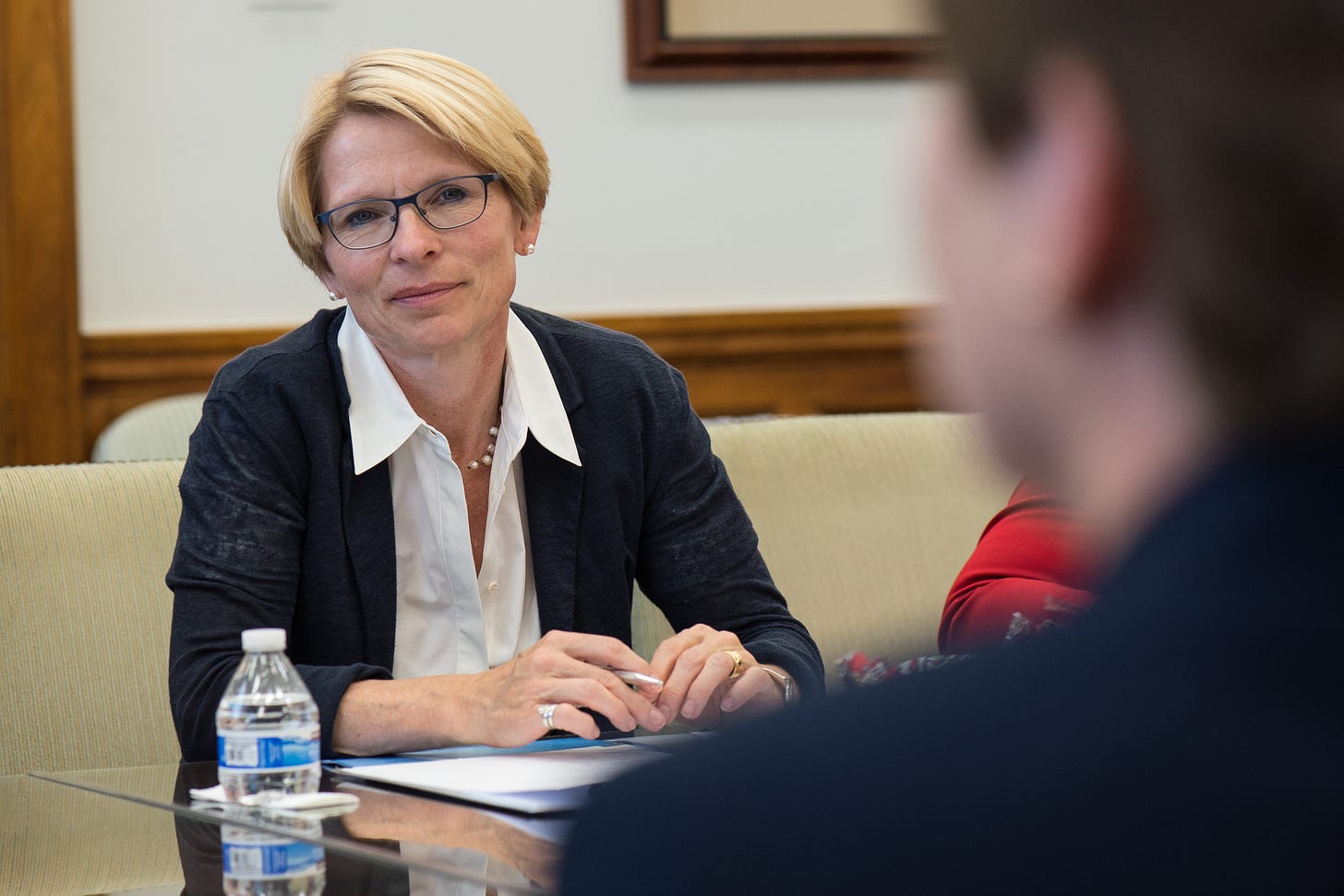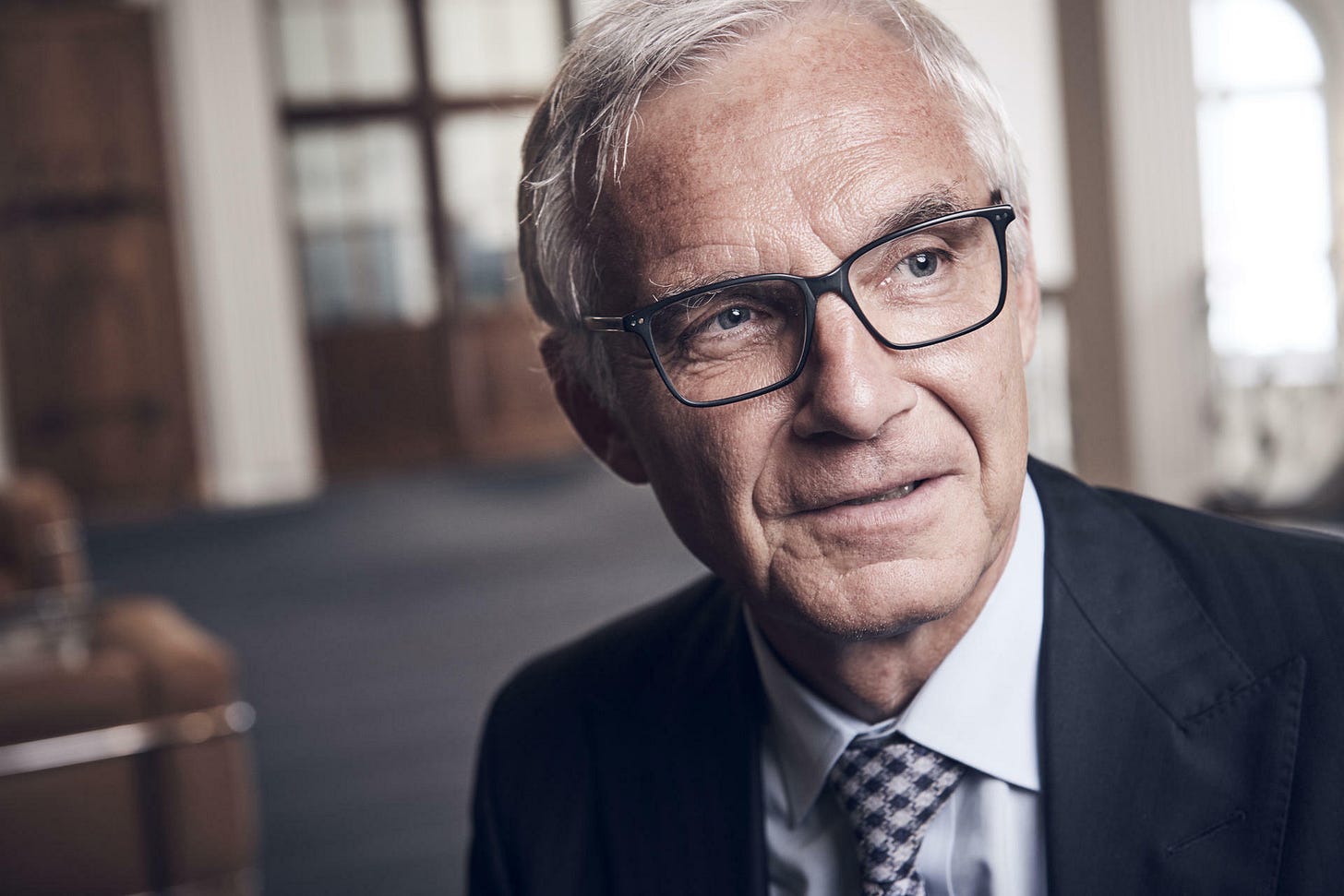Profiles: The Quiet Ones
Urs Rohner, Livia Leu and Threema's founding team - all "special" in their own ways...
Dear Insider,
As promised, we bring you a special issue: Profiles, a closer look at some of the people in the news - with a closer look at their history and their ambitions…
…and, of course, our take on what it shows about how Switzerland “ticks.”
For this first edition, we look at Credit Suisse chairman Urs Rohner (and his ‘white vest’) Swiss diplomat Livia Leu and the three founders of ultra-secure messaging app Threema - Silvan Engeler, Martin Blatter and Manuel Kasper.
Happy reading!
Diplomat in the driver’s seat - Livia Leu
There is hardly a hotter topic in Swiss politics these days.
With its position in the middle of the European continent, Switzerland is bound to maintain good relations with the European Union. Up until now, those relations have been governed by a variety of treaties. Negotiations on a comprehensive “framework agreement” to cover all topics have stalled - with a variety of issues holding things up.
The woman tasked with getting the job done - in one way or another is Livia Leu.
A career diplomat with more than one solution to a sticky situation on her resumé, Leu grew up in the lap of luxury - but not for reasons one might think: her parents ran the greatly successful Kulm Hotel in the mountain resort town of Arosa.
After studying law, she began serving Switzerland in the diplomatic corps in 1989, at a time when women were barely represented among the country’s ambassadors. Today, there are still only 37 out of 154 in total.
FUN FACT: Switzerland was the last country in Europe to open its Foreign Ministry to women - in 1956.
After serving in several international posts, including France and the UN in New York, Leu took on the monumental task of leading the Swiss mission in Iran. There she was not only representing the interests of her home country, but also those of a world superpower - the United States. Her work in that role earned her the thanks (and respect) of another renowned female diplomat, Hillary Rodham Clinton.
Now Livia Lea faces perhaps her greatest task of all.
In October 2020, she was appointed to take over the negotiations of the Swiss-EU framework agreement. Her challenge is daunting - and not without risks. The process fraught with pitfalls and political wrangling has been the task of four predecessors before her. As the fifth, she still has plenty of room for failure.
But her resumé, and position as the 2nd-most senior diplomat after Foreign Minister Ignazio Cassis, may make her the perfect candidate to bring the entire saga to a successful conclusion.
Switzerland is known for being a country of neutrality - and diplomacy. Up until now, it has maintained that reputation despite having relatively few women in positions of power.
Now - in a time of international crisis, when female leaders (think: Christine Lagarde, Lucinda Ardern, and Kamala Harris) are particularly effective in leading their countries and organizations than many male leaders, Switzerland may be able to take another leap forward.
For Livia Leu, finishing this mission would be proof of this indeed.
Three on the quiet side - the founding team of Threema
Security in Switzerland is king.
For years, the wealthy of the world have entrusted their riches to Swiss banks. The Swiss army has, despite its small size, stood ready to defend the country and maintain its neutrality.
And when it comes to data security - Switzerland is also (quietly) leading the way. And Threema - the ultra-secure and private messaging application - is proof of that.
In comparison to WhatsApp, WeChat, or even Telegram, Threema is tiny, with barely 9 million users worldwide.
But its founding team - Silvan Engeler, Martin Blatter and Manuel Kasper - don’t care. They have a different approach.
The three technical co-founders of Threema stay out of the limelight, focus on organic, steady growth, and have been rewarded with the same.
Their 30-person firm has (reluctantly) grabbed a piece of the spotlight after WhatsApp revealed its intention to share more data with parent company Facebook - leading to a mass exodus from the service and a renewed focus on privacy-preserving communications tools. Almost overnight, the number of Threema users quadrupled.
The service has never had such good marketing.
Now, nearly a decade after Manuel Kasper programmed the first version of the Threema app, the company brings in revenues of around CHF 60 million. The vast majority of its users are actually employees of Threema’s enterprise clients: Daimler, Julius Bär, Partners Group, and others.
Engeler, Blatter, and Kasper have more room to grow as well. Last year the trio agreed to sell a majority stake to private equity firm Afinum.
And yet - despite the sale, Threema’s founders seem focused on continuing their quiet rise. It fits their values, their product, and their location.
In Switzerland, they have a secure future.
Wily wizard on his way out - Urs Rohner
Urs Rohner has a clean conscience.
Or so it would seem from the outside.
The outgoing Credit Suiss chairman will depart at the end of the month and leave behind him a legacy of…
…what exactly?
The numbers don’t look too good. Since he became chairman of Switzerland’s second-largest financial institution, Rohner has seen the bank take a hit of CHF 13 billion in fines, scandals, and lost revenue.
And, as recently noted by Swiss weekly NZZ am Sonntag, Rohner seems to always come out the other side with a “white vest”. Following on his famous statement after the bank was slapped with a CHF 2.8 billion fine by US authorities for criminal activities related to tax evasion, Credit Suisse’s top man continues to let others take the fall for the bank’s problems.
To some that might seem like a talent.
Certainly, the 61-year old lawyer by training has survived longer than many might have thought when he first took over. His intelligence and reported photographic memory do not hurt, for sure. They were, no doubt, what helped elevate him from a law firm career to CEO and Chairman of ProSieben Media, to General Counsel and later COO of Credit Suisse.
He is also known to be arrogant and self-centered, with a tendency to put others down in a bossy display of power. Supporters might say such self-assurance is necessary in order to run an operation like Credit Suisse.
Rohner’s good network among politicians and Swissnesses has helped him survive where two foreign CEOs (Brady Dougan and Tidjane Thiam) did not. But it is also exactly this legalistic arrogance that has led to a perception that he did not do his job. News that Rohner will give up his chairman’s bonus, as will the bank’s entire management, does not help
On the whole, Urs Rohner represents a kind of banker that Credit Suisse is not likely to see again - one without banking experience and heavily reliant on personal power and backroom deals to get his way.
Some of these traits may be what helped him reach his position in the first place and stand as certain hallmarks of Swiss political “wheeling and dealing.” But going forward transparency and humility will be the name of the game - in addition to experience.
New chairman Antonio Horta-Osorio has banking experience from his days of turning around Lloyd’s Bank in London. It may be enough to separate him from his predecessor - although it remains to be seen whether being an outsider in Switzerland as chairman is as much of a handicap as it apparently was for two of Rohner’s CEOs.
Meanwhile, the man with the white vest will say goodbye to Paradeplatz and take his spotty record with him.






